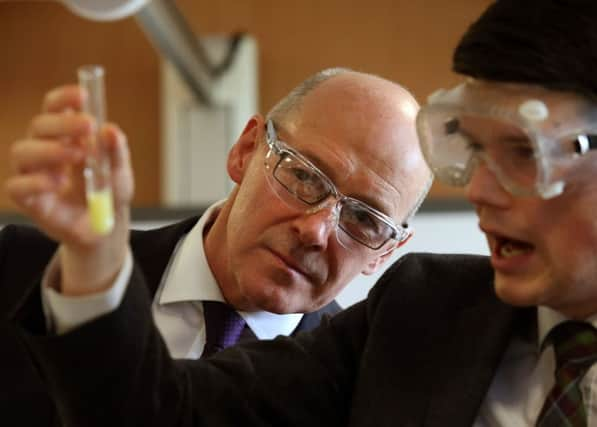Leader comment: John Swinney has one chance to fix education


If John Swinney had any doubts as to the scale of the challenge he will face in his new job as Scotland’s education secretary, his first appointment as part of his new role provided a sharp reminder.
Visiting his former school, Forrester High in Edinburgh, the 52-year-old was faced with an assault on several fronts. As the Scottish Secondary Teachers Association launched a ballot of its members for industrial action amid concerns about “excessive and unreasonable” demands on staff,” the National Parent Forum of Scotland warned current Scottish Government plans could see five-year-old primary pupils asked to sit hour-long tests.
Advertisement
Hide AdAdvertisement
Hide AdMr Swinney addressed the issues competently during his homecoming, stressing that there was no desire for a return to “stressful testing,” but, as well he knows, his baptism of fire is only beginning.
His appointment to the brief after nine years as Scotland’s finance secretary is evidence of the work required to transform the country’s education system. First Minister Nicola Sturgeon has said as much, noting that Mr Swinney’s appointment to “this crucial role demonstrates how important education is to my government”. She seems serious about making education the priority for the next five years, and rightly so.
Scotland is lagging behind in terms of performance in international league tables for education. The gravest problem, however, is the attainment gap between the nation’s wealthiest and most deprived pupils. For a government that puts equality at the heart of its policies, addressing this is disparity is vital if Mr Swinney’s tenure is to be deemed a success.
The government has already pledged to double the funding allocated to this cause over the next three years from £80 million to £160m, but the investment must be carefully focused and Mr Swinney must consult far and wide over how best to achieve this.
He is regarded, with considerable justification, as one of Scotland’s most gifted politicians. But he cannot rely on his reputation alone to restore confidence to the education sector. Indeed, some argue the scale of change required demands a more radical politician at the helm, although Mr Swinney’s proven abilities as a safe pair of hands mean his appointment is a sage one.
A few tweaks to his approach would be beneficial. In his finance brief, he adopted a hardline stance with local authorities over budgets, a stand-off that caused lasting damage to the relationship between central and local government. He must surely realise that taking the same approach as education secretary would be a guarantee of failure.
The teachers at the frontline are among the first people Mr Swinney must listen to and although he is in for tough times with the unions, he should seek to build bridges if he is to usher in meaningful, lasting change.
He needs to consider the job ahead carefully and make sure he gets it right. Ideally, he would have the space to do so, but children only get one education; time is of the essence.
Pilot a boon for safer communities
Advertisement
Hide AdAdvertisement
Hide AdAn increased focus by police allied to vigilance on the part of homeowners has meant that the rate of recorded housebreaking incidents has plummeted in Scotland, down from 31,319 in 2005/6 to 20,607 last year.
However, the crime continues to impact on a sizeable number of victims. Ordinary families suffer twice, first as their treasured possessions are stolen and secondly when they are left feeling insecure in their home, which ought to be a place of sanctuary.
Consequently, no one should be complacent in the fight against housebreaking. That it is why a new pilot study rolled out in the Stirling area should be welcomed.
The scheme saw Police Scotland provide around 600 SmartWater kits to households in Killearn and Blanefield, rural areas that have suffered from a spate of break-ins.
The device includes a solution that is brushed on to a homeowner’s possessions. Detectable under UV light and almost impossible to remove, it retains the DNA evidence of anyone who touches it.
Such technology is a boon for prosecutors, given that it provides a direct link between the accused and the crime scene. More importantly, it also serves as a deterrent, with prominent signs in the area alerting would-be criminals that the properties make use of the system.
Police revealed that since the kits were rolled out, the number of recorded break-ins in the pilot area has dropped from 23 to zero.
Impressed by these early results, Stirling Council is giving consideration to extending the scheme. Other local authorities would do well to follow suit. The evidence suggests this is a surefire way of making communities safer.